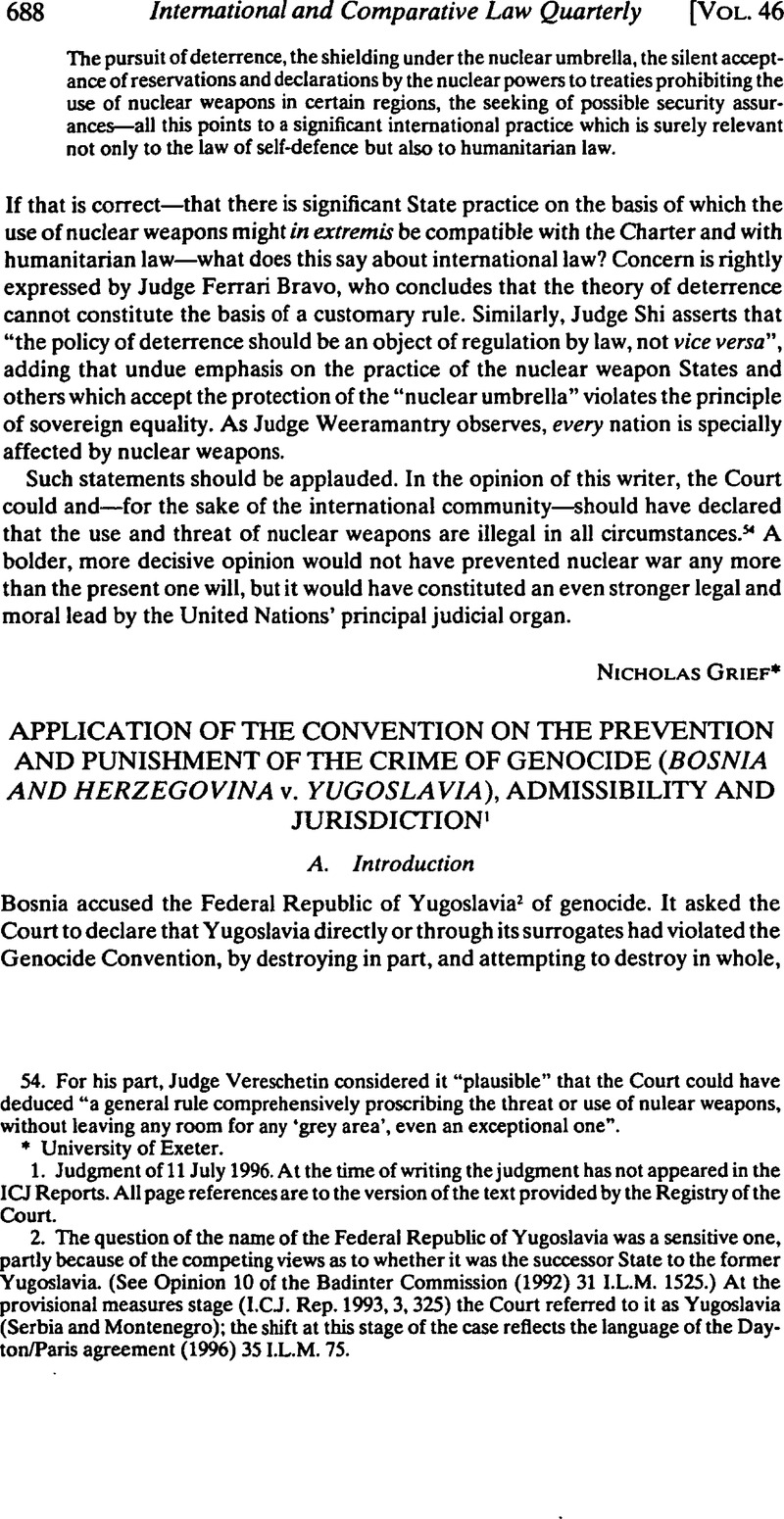Published online by Cambridge University Press: 17 January 2008

1. Judgment of 11 July 1996. At the time of writing the judgment has not appeared in the ICJ Reports. All page references are to the version of the text provided by the Registry of the Court.
2. The question of the name of the Federal Republic of Yugoslavia was a sensitive one, partly because of the competing views as to whether it was the successor State to the former Yugoslavia. (See Opinion 10 of the Badinter Commission (1992) 31 I.L.M. 1525.Google Scholar) At the provisional measures stage (I.C.J. Rep. 1993, 3, 325Google Scholar) the Court referred to it as Yugoslavia (Serbia and Montenegro); the shift at this stage of the case reflects the language of the Dayton/Paris agreement (1996) 351.L.M. 75.Google Scholar
3. This list of requests to the Court represents a narrowing of Bosnia's original application to claims specifically of genocide or of acts related to genocide. This was apparently in response to the Court's finding at the provisional measures stage that its jurisdiction was prima facie based on Article IX of the Genocide Convention and did not extend to claims outside that Convention. However, Bosnia reserved the right to supplement its submissions to invoke other titles of jurisdiction and to revive its previous submissions (supra n.l, at para.14).
4. Jennings, R. Y., “The International Court of Justice after Fifty Years” (1995) 89 A.J. 493Google Scholar; Saab, G. Abi, “The International Court as a World Court”, in Lowe, V. and Fitz-maurice, M. (Eds), Fifty Years of the International Court of Justice (1996), p.3.CrossRefGoogle Scholar
5. E.g. supra n.l, at paras.22,31,34.
6. I.C.J. Rep. 1993, 3, 325Google Scholar; see Gray, C. 1994 (43) I.C.L.Q. 704.Google Scholar
7. I.C.J. Rep. 1996Google Scholar, dissenting opinion of Judge Higgins, at para.7.
8. Third and sixth preliminary objections. In its second preliminary objection Yugoslavia also challenged the admissibility of the case on the ground that President Izetbegovic had no right to act for Bosnia. This was rejected (supra n.l, at para.44), as it had been earlier at the provisional measures stage (I.C.J. Rep. 1993, 11, para.13).Google Scholar
9. Supra n.l, at para. 19.
10. See the Badinter Commission, Opinion 2, for a rather opaque ruling on the rights of the Bosnian Serbs (1992) 31 I.L.M. 1497.Google Scholar As earlier in the East Timor case. (I.C.J. Rep. 1995, 90Google Scholar; see Chinkin, C. (1996) 45 I.C.L.Q. 712)Google Scholar, the Court was not drawn into a discussion of the consequences of a breach of the right of self-determination.
11. Supra n.l, at para.20.
12. The Court had also avoided the issue at the provisional measures stage; see Gray, op. cit. supra n.6. On automatic succession, see e.g. Mullerson, R., “The Continuity and Succession of States by Reference to the Former USSR and Yugoslavia” (1993) 42 I.C.L.Q. 473Google Scholar; Oppenheim's International Law (9th edn, Jennings, R. Y. and Watts, A. (Eds), 1992), Vol.1, p.222.Google Scholar
13. Separate Opinion p.1.
14. Separate Opinion p.l.
15. Separate Opinion p.l.
16. Separate Opinion p.109.
17. Supra n.l, at para.23. The Court's avoidance of technicalities may be seen also in its discussion of accession at para.24 and of the effects of non-recognition at para.26.
18. Idem, paras.25,26.
19. Preliminary objection 7.
20. Supra n.l, at para.34.
21. Preliminary objections 1 and 5.
22. Supra n.l, at para.30.
23. Idem, para.31. On the characterisation of the conflict in Bosnia, see Gray, C., “Bosnia and Herzegovina: Civil War or Interstate Conflict? Characterisation and Consequences” (1996) 67 B.Y.I.L. 155.Google Scholar
24. Para.31, ibid.
25. Ibid.
26. On erga omnes obligations see Oppenheim's International Law, op. cit. supra n.12, at p.5.Google Scholar
27. East Timor (Portugal v. Australia) I.C.J. Rep. 1995, 90.Google Scholar The Court said that the people of East Timor have the right of self-determination and that this was a right erga omnes, but it nevertheless refused to decide the case in the absence of Indonesia. See Chinkin, op. cit. supra n.10.
28. Supra n.l, at para.32.
29. Separate opinion, para.10.
30. Joint separate opinion.
31. Supra n.l, at paras.31, 32.
32. I.C.J. Rep. 1996.Google Scholar
33. See note by M.D. Evans, immediately following this note.